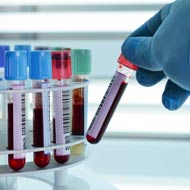
Can detect cancer eight months before any visible signs
Scientists have developed a blood test for breast cancer which can identify which patients will relapse after treatment, months before any visible signs.
The test, developed by scientists at the Institute of Cancer Research, London and the Royal Marsden NHS Foundation, reveals small amounts of residual cancer cells that have resisted therapy by detecting cancer DNA in the bloodstream.
It is hoped that by deciphering the DNA code found in blood samples, it will be possible to identfy lethal mutations in patients and adapt their treatment accordingly.
Study leader Dr Nicholas Turner, team leader in Molecular Oncology at the ICR and consultant medical oncologist at The Royal Marsden, said: “We have shown how a simple blood test has the potential to accurately predict which patients will relapse from breast cancer, much earlier than we can currently.
"We also used blood tests to build a picture of how the cancer was evolving over time, and this information could be invaluable to help doctors select the correct drugs to treat the cancer."
In the study, published in Science Translational Medicine, the scientists took tumour and blood samples from 55 breast cancer patients who were at high risk of relapse.
The scientists analysed the mutated DNA of the tumour and then proceeded to search the blood for those mutations - a technique known as "mutation tracking".
Women who tested positive for circulating tumour DNA were 12 times more likely to suffer relapse than those who tested negative, and the return of their cancer was detected on average eight months before any visible signs emerged.
The study is the first of its kind to show that blood tests can be used to predict relapse. It will be some time before the test could be available in hospitals, but larger clinical trials will begin next year.



 The latest
The latest